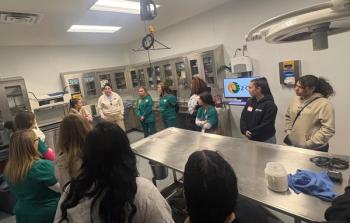
Genetic mutation could cause severe reactions from feline parasite preventives
This serious, even fatal neurological reaction could impact more than half a million cats in the United States
This article was updated April 5, 2024.
A study conducted by the Program for Individualized Medicine at Washington State University (WSU) discovered cats with the MDR1 genetic mutation could be at risk of developing severe adverse effects to eprinomectin.1 This active ingredient is found in some parasite preventives for felines. Although these parasite prevention products can be completely safe for a majority of cats, animals with the MDR1 genetic mutation could experience a serious, even fatal neurological reaction to the medication.2
Investigators at WSU found that the mutation causes an absence of protective mechanisms that would typically protect against drug ingredients, such as eprinomectin, from accessing the brain and inducing severe neurological toxicity.2
“Almost every week we receive reports about someone’s pet cat having serious reactions to eprinomectin. This is not an issue with the drug itself — the problem lies in the genes of 1% of cats. That is a sizable number considering there are over 60 million pet cats in the US, and we’re trying to increase general awareness of these risks,” Katrina Mealey, DVM, PhD, a WSU veterinarian and pharmacologist who led the research, said in a news release.2
This research should not cause owners to avoid using parasite preventions in general, but instead prompt veterinary professionals and owners to test cats for this mutation. Another study conducted in 2022 tested cats for MDR1 and found the gene mutation to be present in 126/11,036 (1.1%) cats of this study's participants.3 This study had cats of the following breeds:
- Balinese
- Maine Coon
- Maine Coon Polydactyl
- Ragdoll
- Siamese
- Turkish Angora
- Non-pedigreed cats
The study, published in the Journal of Veterinary Pharmacology and Therapeutics, examined 33 cats that reported adverse effects after receiving treatment with products containing eprinomectin. Researchers wanted to rule out any other potential cause of neurological toxicity and found that 14 cats had no other reasonable cause besides the MDRI mutation. Out of those 14 cats, 8 were homozygous — having 2 copies of the same gene — for the MDR1 mutation, which occurs in less than 1% of the general feline population.1,2 Unfortunately, several cats were hospitalized for toxicosis and 3 of those homozygous cats died from neurological toxicity.2 Most of the cats were young, at less than 10 years of age.1 Adverse reactions to eprinomectin were reported as several different symptoms including the following:2
- Loss of coordination
- Increased salivation
- Tremors
- Partial paralysis
- Dilated pupils
- Coma
- Seizures
Additionally, some cats in the study were unable to retract or use their tongue completely for days to weeks after eprinomectin application. Mealey and the other investigators observed that clinical symptoms typically manifested several hours after the application of these products, as they are topically administered with delayed systemic absorption. Hence, it is advisable to monitor cats for up to 12 hours following the application of the product.2
“While this appears like a small number of cases, we consistently receive new reports. If this were happening in human patients, federal agencies would be issuing regulatory actions immediately,” Mealey said in the release. “The results indicate cats with the MDR1 mutation are at high risk for experiencing serious adverse effects from products containing eprinomectin, and they should not be treated with these products.”2
According to the release, Mealey is hoping this study can prompt the FDA to reevaluate products containing eprinomectin and consider warning labels for future use.
To know whether or not a cat possesses the MDR1 mutation, genetic testing is the only method. Mealey is the pioneer behind the discovery of the MDR1 mutation and the creator of the first test to detect it. According to Mealey, MDR1 genotyping could have pinpointed cats at risk and prevented these severe and fatal incidents from occurring in more than 50% of the cases examined.2
In an email to dvm360, officials with Boehringer Ingelheim shared the following statement:
"At Boehringer Ingelheim, we advance the health and well-being of animals through safe and effective products that treat and protect animals from a range of parasites and their health impact, including the transmission of potentially life-threatening diseases. We are confident in the safety of our feline eprinomectin-based products based on 10 years of global pharmacovigilance data. Our eprinomectin-based products for cats have been approved by regulatory authorities for use in more than 45 countries since the launch in 2014. Supported by clinical studies and with more than 100 million doses of feline eprinomectin-containing products sold, these products have maintained a positive and stable safety profile.
“FDA and its Center for Veterinary Medicine apply rigorous scientific review before approval and continue to monitor for quality, safety and effectiveness once the product is commercially available. Boehringer Ingelheim complies with the FDA’s drug safety surveillance and pharmacovigilance evaluations and reports all adverse events for its products to the FDA."
References
- Mealey KL, Burke NS, Villarino, NF, Court MH, Heusser JP. Application of eprinomectin-containing parasiticides at label doses causes neurological toxicosis in cats homozygous for ABCB11930_1931del TC. Journal of Veterinary Pharmacology and Therapeutics. 2024;47(2) 1–5.
https://doi.org/10.1111/jvp.13431 - Roktya D. Cats with MDR1 mutation at risk of severe reactions to popular medication. Washington State University College of Veterinary Medicine. March 28, 2024. Accessed March 29, 2024.
https://news.wsu.edu/press-release/2024/03/28/cats-with-mdr1-mutation-at-risk-of-severe-reactions-to-popular-medication/ - Anderson H, Davison S, Lytle KM, Honkanen L, Freyer J, Mathlin J, et al. Genetic epidemiology of blood type, disease and trait variants, and genome-wide genetic diversity in over 11,000 domestic cats. PLoS Genet. 2022;18(6): e1009804. https://doi.org/10.1371/journal.pgen.1009804
Newsletter
From exam room tips to practice management insights, get trusted veterinary news delivered straight to your inbox—subscribe to dvm360.






